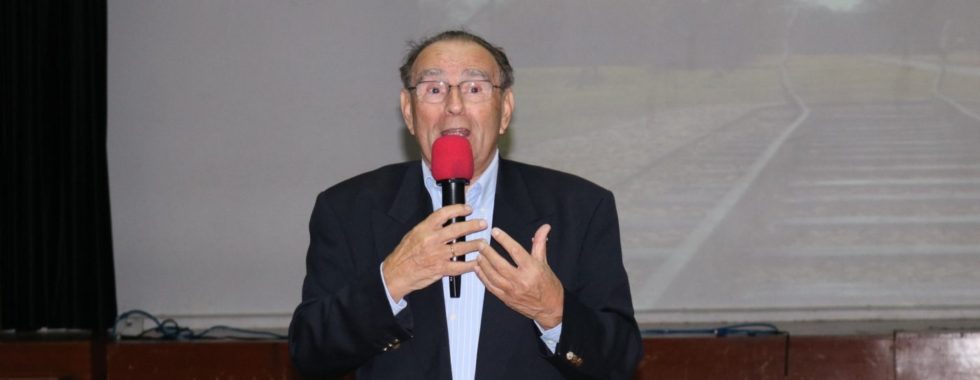Holocaust Survivor, Micha Gelber Moves and Shocks Students
Holocuast survivor, Micha Gelber was born in 1935, in the Netherlands. He told Island School students how he and his family survived the war and Bergen-Belsen concentration camp.
GCSE history student Daanyal Ebrahim had this to say after hearing from Gelber: “It was an amazing experience. Micha Gebler retold a vivid, and tragic story, that moved all of us. I was shocked when I heard how brutal some of the German police were. Despite the fact that we have been discussing [in the classroom] the prejudice that the Jewish people suffered, it was nothing like hearing a firsthand account of the horrific acts committed by Nazi Germany, and the dark times that Jews had to live in.”
You can read a summary of Micha Gelber’s presentation here.
I grew-up in a small city called Ede, occupied by the Germans in 1940. Being Jewish my brother and I were not allowed to go to school –we were restricted as we couldn’t leave the village but the real damage hadn’t started yet. That same year Jewish people had to deliver anything of value to the bank: money, shares, jewelry, antiques – all confiscated.
We were forced to use our clothing coupons to make stars and wear them; any Jewish person seen without a star was arrested and deported to Poland.
Then the Germans confiscated our house, we had nowhere to live but after a month we found a little house by the railway. A Dutch policeman told my father the first wave of arrests were coming and we should go into hiding – my mother and I hid with a nurse from my father’s work while my brother and father hid with his colleague. The mass execution of Jewish people was very efficient, between March and July of 1943 34,300 people went to (concentration camp) Sobibor.
We came out of hiding and returned to our house but a few months later we were thrown out again and my father’s work permit was cancelled. The Dutch policeman told us about another wave of arrests but my father decided not to go into hiding. He didn’t want to split the family up and the Nazis would have pursued us until they found us. On reflection I can only say my father didn’t know what was coming. On 30 July, 1943 we were transferred to the transit concentration camp in The Netherlands called Westerbork.
From here the majority of the Dutch Jewish population was deported to Poland and exterminated. My family stayed a total of 5 months in Westerbork as we were to be exchanged for German nationals living in Palestine. While there we got Palestine Red Cross exchange certificates, which meant we were earmarked as exchange Jews – not to be exterminated. Every Monday night we would hear names being read out and see people transported away.
On the 11 January, 1944 we were deported to Bergen Belsen (the concentration camp were Anne Frank died). When we got to Bergen Belsen – they didn’t shave our heads or take away our clothes I didn’t have a number tattooed on my arm, we stayed together as a family – at night my father slept in men’s barracks but my mother, brother and I shared a bed. I was 8 years old at the time. During the day I followed my father around, his job was as a technical person on camp. There was no medicine and typhoid and dysentery were rife. My father got typhoid and spent two weeks in hospital, when a German doctor asked him his name he said – “Eric” the doctor replied “that is the same as my name.” So he could stay in hospital which saved his life.
We survived at Bergen Belsen for 15 months but just 5 days before the British liberation we were shipped eastward on the 10 April, 1945 either to be exterminated or to be used for human trading with the Russians.
En route after a horrible train trip of a fortnight we were liberated by the Russians in the eastern part of Germany just south of Berlin.
June 30th 1945 we returned to The Netherlands, first to Ede and shortly thereafter to Arnhem. I started school when I was 10 without any previous education due to the war.
But I want to tell you this I am a holocaust survivor not a victim.

